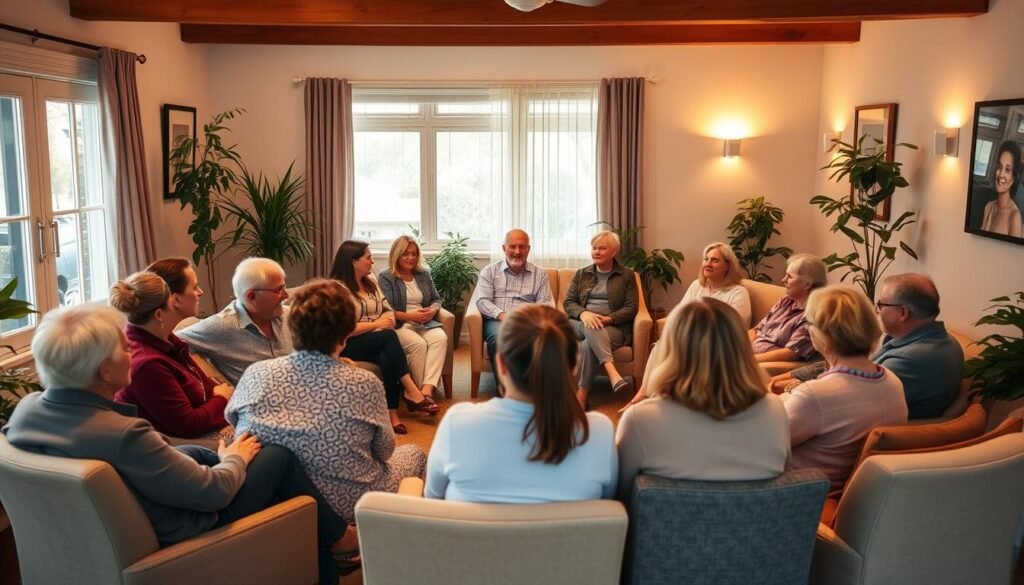Did you know that lung cancer takes nearly 160,000 American lives each year? It’s the top cause of cancer deaths in the United States. This fact isn’t just about numbers. It shows how important community support is for those facing lung cancer. Support groups offer vital help and a sense of unity for patients and their loved ones.
These groups are spaces where people share stories, tips, and useful information about lung cancer. By connecting, members gain strength and understanding through common experiences. For those looking for support, there are many resources. These include online groups and helplines from organizations like the American Cancer Society.
You can find more about these support options by visiting American Cancer Society’s support programs.
Key Takeaways
- Lung cancer support groups provide vital emotional and practical assistance.
- They offer a safe space for members to share their experiences and coping strategies.
- Joining these groups can improve the quality of life for lung cancer patients.
- Resources are available through organizations like the American Cancer Society.
- Connecting with others helps foster a sense of community and reduces feelings of isolation.
- Support groups can enhance coping mechanisms and promote emotional resilience.
- Participation in these groups encourages open discussions about feelings and challenges.
Understanding Lung Cancer Support Groups
Lung cancer is a tough diagnosis, affecting not just the patient but also their family and friends. Lung cancer support groups offer a place to share stories and get advice. They help people deal with cancer’s emotional and physical challenges.
What Are Support Groups?
Support groups bring together people touched by cancer. They include patients and those who care for them. These groups help people share feelings and connect with others in similar situations. Studies show they improve life quality and might increase survival chances. Being part of such a group shows you’re not fighting alone.
Importance of Emotional Support for Patients
The right emotional support is key for those facing lung cancer. Support groups provide more than just company; they offer understanding. Sharing stories eases loneliness, while giving and getting support builds strength. Feeling heard and supported empowers people to face their treatment with hope.
Benefits of Joining Lung Cancer Support Groups
Joining lung cancer support groups has many advantages. It makes the tough journey a bit easier. These groups create a community. Here, members share stories and learn from each other. Let’s look at some key benefits of being part of these groups.
Improved Quality of Life
Many say their quality of life gets better in these groups. They feel less lonely and isolated. This emotional support is key for feeling mentally strong.
Group members talk about their challenges. They find new ways to make everyday life better. Sharing these tactics helps everyone.
Shared Experiences and Coping Mechanisms
Being able to share experiences is invaluable. People find others going through the same struggles. They share tips on how to deal with treatment and emotional ups and downs.
This connection gives insights into dealing with lung cancer’s challenges. It’s about finding what works best to stay strong during this time.
Access to Valuable Resources and Information
Support groups are great for finding lung cancer resources. Experts often give talks on treatment options and holistic care. This is very helpful.
Members learn about managing side effects and talking to doctors. They also discover the best foods to eat. A great place for more support info is here.

| Benefit | Description |
|---|---|
| Emotional Support | Fosters connections that alleviate feelings of isolation, leading to better mental health. |
| Shared Knowledge | Encourages the exchange of effective coping strategies and personal experiences. |
| Information Access | Provides access to educational resources about treatments, therapies, and holistic care. |
| Community Building | Creates a supportive environment where individuals can share hope and encouragement. |
Types of Lung Cancer Support Groups
Finding the best support during a lung cancer journey is crucial. There are various options to fit different needs. Among them, in-person meetings, online platforms, and telephone support groups stand out.
In-Person Support Groups
Traditional in-person support groups meet at places like hospitals or community centers. These meetings allow people to share stories and learn from each other. They often focus on specific groups, like age or cancer type.
Being part of these groups fosters a strong sense of belonging. This connection encourages open discussion, easing fears and anxieties about their health challenges.
Online Lung Cancer Support Options
Online support provides a versatile solution for those who cannot join in person. Services like CancerCare offer free groups for patients and caregivers. People can share experiences and tips from anywhere.
These online groups cover many topics and offer coping circles. They are available in English and Spanish, making them accessible to a wider audience.
Telephone Support Groups
Telephone groups make support available across distances. They let people share their experiences via a simple phone call. This approach is comforting and offers privacy to some.
Through helplines or group calls, these phone groups offer solace. They give those in need a chance to find support and friendship.

Finding Local Lung Cancer Support Groups
Finding local support when you have lung cancer is key. It helps to connect with others who truly understand. Many lung cancer resources aim to guide patients and their families to the right supports.
Resources for Locating Groups in Your Area
Look to local hospitals and cancer centers for lists of lung cancer support groups. Online tools like the American Cancer Society Support Group Search are useful. They join the American Lung Association and the National Support Group Network in this effort.
Check out the National Cancer Institute’s database for a detailed search. Social media, especially Facebook, has many disease-specific or area-focused groups.
Connecting with Healthcare Professionals
Healthcare providers play a crucial role in guiding you to support resources. Oncologists and nurses often know about local groups or events. They can introduce you to new resources.
Options like CancerCare Telephone Counseling are innovative. They let you connect with others from home. For caregivers, groups from CancerSupport Community and CancerCare offer needed support. The Lung Cancer Support Line at (844) 835-4325 is a great place to get help too.

Online Lung Cancer Support: Virtual Communities
Online lung cancer support is crucial for both patients and caregivers. They find community and information in these virtual spaces. From their homes, they can meet others, share experiences, and find important resources. Digital support groups offer easier access for those dealing with lung cancer.
Advantages of Online Support Groups
Online groups are flexible, unlike traditional face-to-face meetings. People can take part no matter where they live or their schedules. They’re great for those with travel issues or who seek privacy. Benefits include:
- Privacy: You can talk freely without being judged, thanks to anonymity.
- Convenience: Join from home, which is perfect for those with health issues.
- Accessibility: They connect folks from different places and backgrounds.
- Variety of Resources: These platforms provide educational content, webinars, and peer support.
Cancersurvivorsnetwork and Other Online Platforms
The Cancersurvivorsnetwork is a great spot for those touched by lung cancer. It’s a space where patients, survivors, and caregivers can support each other. They exchange stories, advice, and coping tips. It’s a key source of both emotional and informational aid. Here are some platforms to consider:
| Platform | Description | Features |
|---|---|---|
| LUNGevity | A nonprofit focusing on lung cancer support. | HELPLine, peer mentoring, survivor events. |
| American Cancer Society | Has lots of online community spaces. | Discussion boards, chat rooms, ACS CARES™ program. |
| CaringBridge | Helps share health updates with friends and family. | Personal websites for storytelling and support. |
Being part of online communities makes people feel less alone with lung cancer. They offer emotional support and practical advice. This can help improve life quality for everyone affected.
Support for Families of Lung Cancer Patients
Families facing lung cancer go through tough emotional and psychological times. It’s important to understand their experiences to offer the right support. Getting through the illness together can reduce stress. This makes finding a support network where they can share their stories very important.
Understanding Family Dynamics and Stress
Lung cancer doesn’t only affect the patient; families feel it too. They may deal with fear, uncertainty, and worry about what’s next. joining family support groups can lighten this load. At these meetings, they can talk about their feelings openly. This often leads to a stronger, more resilient family.
Family Support Groups and Resources
Family support groups are a big help. They offer a place to talk and learn from others in similar situations. Highlights of joining these groups include:
- Regular meetings for discussing emotional and practical challenges
- Access to educational resources that inform family members about lung cancer and its implications
- Companionship opportunities, which can reduce feelings of isolation
- Transportation services available in certain regions, helping families access care without added stress
By joining, families gain new ways to cope and support each other and the patient. This helps everyone’s well-being.
Lung Cancer Survivor Support
The journey of a lung cancer survivor often involves overcoming significant challenges. Support from others is crucial in this journey. By sharing personal experiences, lung cancer survivor support groups uplift spirits and foster hope.
Sharing Stories of Triumph
In these groups, individuals share their stories of resilience and victory. These stories strengthen not only the storytellers but also others facing similar challenges. Hearing about survivors’ journeys offers insights and coping strategies.
Through these shared experiences, a strong bond forms within the community. This creates a safe space for expressing emotions and fears.
Building a Lasting Community
Creating a lasting community is key for support and empowerment. Survivors connect through online forums, in-person gatherings, and virtual meetups. These communities become places for mentorship and navigating lung cancer complexities.
Organizations like LUNGevity offer various programs, including the Lung Cancer HELPLine. This serves as a resource for patients and caregivers seeking guidance. For more information and support, visit lung cancer support communities.
How to Offer Support
Supporting someone with lung cancer is more than just being there. It’s about actively helping them on their journey to emotional and mental health. Encouraging them often boosts their spirits. A great way to help is by encouraging loved ones to join support groups. These groups reduce feelings of being alone. They also let people share their stories and ways of coping.
Encouraging Your Loved Ones to Join
Talking about joining a support group can be sensitive. It helps to explain how these groups build a sense of community. They also offer helpful resources. Mentioning the opportunity to meet others facing similar challenges can be persuasive. Going with them to the first meeting can make it less intimidating. It turns a scary step into a journey you take together.
Resources to Share with Patients and Families
Providing relevant information about support options is crucial. Pointing out local and online groups designed for lung cancer patients is a good first step. Here are some resources to consider:
| Group Name | Description | Frequency |
|---|---|---|
| Lung Cancer Support Group | Open to patients undergoing treatment for lung cancer. | 2nd Tuesday of the month (12:00 – 1:30 pm) |
| Cancer to Health Program | An 8-session program for newly diagnosed patients on stress management and coping skills. | Weekly sessions |
| Support Groups for Families | Provide assistance to family members who have lost a loved one within the past year. | Monthly meetings |
| Young Adult Support Group | Cater to individuals aged 18-40 undergoing treatment or recently completed it. | Bi-weekly sessions |
| Online Resources | Platforms like Stupid Cancer and CancerCare offer online support groups and meetups. | Various schedules |
Sharing these resources to share with patients and families helps people seek the support they need. It encourages connections with others who understand their situation. Building a community like this can greatly improve emotional support for both patients and their families.
Conclusion
Lung cancer support groups are very important. They help lung cancer patients and their families deal with emotional and practical problems. In the United States, there are fewer than 100 active groups for over 224,000 people diagnosed each year. These groups make a big difference in the lives of those affected by the disease.
They share experiences that bring hope and build resilience. This is because members go through their treatment journeys together. Being part of such communities gives people access to important lung cancer information. It helps them know how to speak up for themselves in healthcare situations.
Joining these groups helps reduce stress and makes people feel like they belong. Those who take part feel more confident in handling their healthcare needs. With more than 2 million new cases of lung cancer worldwide in 2018, the emotional support from these groups is vital.
Lung cancer’s journey can feel less lonely with these groups. They offer support through face-to-face meetings, online chats, or family help. The encouragement and stories shared by the community give people strength. They make facing lung cancer’s challenges a little easier.